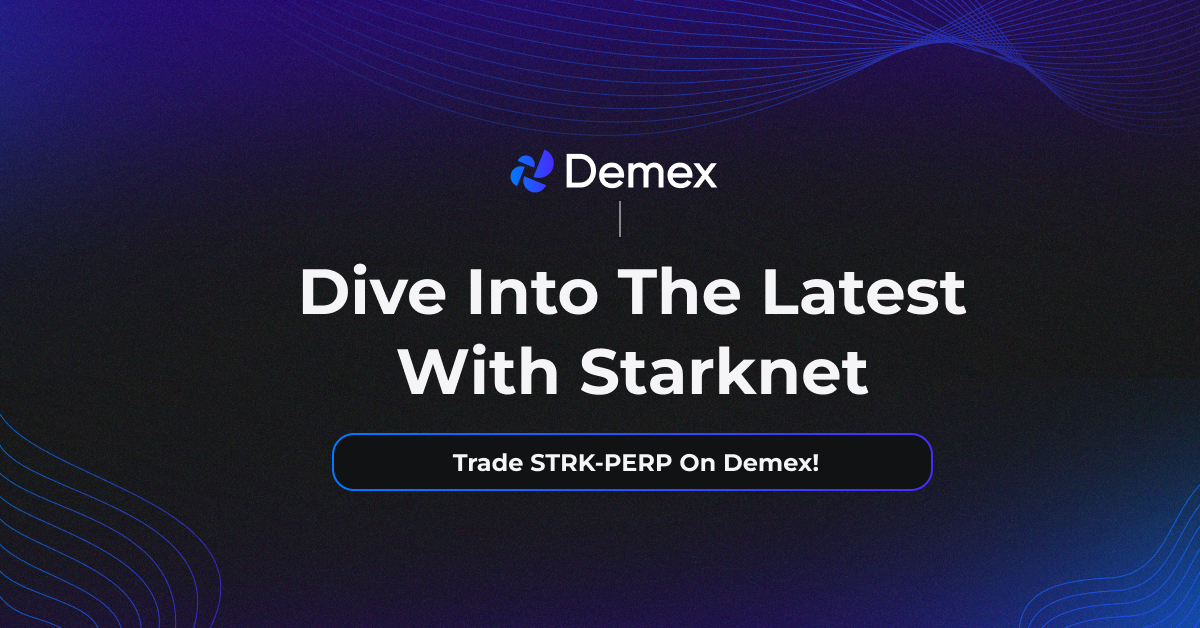Starknet: A Deep Dive into Ethereum's Rising Star for Scaling and Gaming

Remember how Demex introduced STRK pre-launch perpetual contracts initially, offering users a way to leverage the price movements of the Starknet token (STRK)? This article dives deeper into the exciting world of Starknet, exploring its role in scaling Ethereum, its impact on blockchain gaming, and its potential to revolutionize the DeFi landscape. Buckle up for a deep dive into this innovative layer-2 solution!
In my previous blog post on Demex's introduction of STRK perpetual contracts, I explored the platform's innovative approach to pre-launch markets, focusing on the introduction of STRK perps. Check it out.
Introduction
Ethereum, the leading blockchain platform, has revolutionized decentralized applications (dApps) and smart contracts. However, its popularity has resulted in network congestion and high transaction fees. This has hindered the widespread adoption of dApps and limited Ethereum's scalability.
Enter Starknet, a layer-2 scaling solution designed to address these challenges and propel Ethereum towards mainstream usability. This blog post delves into the recent developments surrounding Starknet, exploring its role in enhancing Ethereum's scalability, its impact on the burgeoning blockchain gaming industry, and its future roadmap.

Understanding Starknet: A Layer-2 Solution for Ethereum's Bottlenecks
Unlike traditional blockchains that process every transaction directly, Starknet operates as a layer-2 scaling solution. It bundles numerous transactions off-chain, verifies their validity using cryptographic proofs called STARKs (Scalable Transparent Argument of Knowledge), and then submits these proofs to the Ethereum mainnet for final settlement. This significantly reduces the computational burden on the Ethereum blockchain, leading to faster transaction processing and lower fees.
Ethereum's Dencun Hard Fork: A Boon for Starknet's Scalability
The recent Dencun hard fork on Ethereum implemented several enhancements with significant implications for Starknet. A crucial feature is the introduction of EIP-4844, which introduces "blob storage" for layer-2 rollups. Previously, rollups stored data directly on the Ethereum blockchain, incurring high storage costs. Blob storage provides a considerably cheaper alternative, significantly reducing the overall cost of transactions on Starknet.
Starknet Anticipates a 90% Fee Reduction
Due to the nature of Starknet, where most data resides in call data, the network is poised to benefit immensely from the cheaper blob storage solution. This translates to a projected 90% decrease in transaction fees for Starknet users.
GM fam
— Starknet_Digger 🦇🔊 (@Starknet_OG) March 13, 2024
Today is a historic day for the entire Ethereum ecosystem
Let's destroy these Rollups fees, blobs 👻 pic.twitter.com/Emu0s21FEg
Starknet Gaming Committee: Fueling the Future of Blockchain Gaming
Recognizing the immense potential of blockchain gaming, the Starknet Foundation established a dedicated committee focused on fostering game development within the Starknet ecosystem. This committee boasts a war chest of $125.5 million worth of tokens to fund various initiatives. Their primary objective is to incentivize game developers to leverage the advantages of Starknet's scalability and low transaction fees.
$125 Million Investment: A Strategic Move Amidst NFT Market Fluctuations
This substantial investment by the Starknet Foundation comes at a time when the NFT market has experienced a correction in prices. This strategic move signifies the committee's long-term vision for the future of blockchain gaming and their unwavering belief in Starknet's ability to become the preferred platform for developers in this rapidly evolving space.
Beyond Dencun: Starknet's Roadmap for Enhanced Scalability and Fee Reduction
Starknet's commitment to continuous improvement extends beyond the benefits offered by the Dencun hard fork. The team is actively working on further upgrades to solidify its position as a leading layer-2 scaling solution.
- Starknet v0.12.0 and Beyond: Embracing Rust for Performance Improvements: The upcoming Starknet v0.12.0 release focuses on incorporating Rust, a high-performance programming language, into the core components of the network. This transition is expected to significantly reduce block execution time and enhance the overall throughput of the network.
Demex and STRK Perpetual Contracts
Building on the foundation of Starknet's potential, Demex launched the STRK perpetual contracts. These contracts allow users to speculate on the price movements of the Starknet token (STRK) despite upward or downward price swings. This innovative product caters to traders seeking to capitalize on the potential price fluctuations surrounding a new token.

Leveraging the Market with Demex
Demex offers STRK perpetual contracts with leverage of up to 20x. This feature enables traders to amplify their potential returns (and potential losses) by putting down a smaller amount of capital compared to the total position value. However, it's crucial to emphasize that leverage trading involves significant risks and should only be undertaken by experienced traders with a high tolerance for risk.
The TLDR
Ethereum struggles with high fees and slow transactions. Starknet, a layer-2 solution, swoops in to save the day! It bundles transactions off-chain, verifies them with cryptographic proofs, and submits them to Ethereum for settlement. This translates to faster speeds and lower fees.

